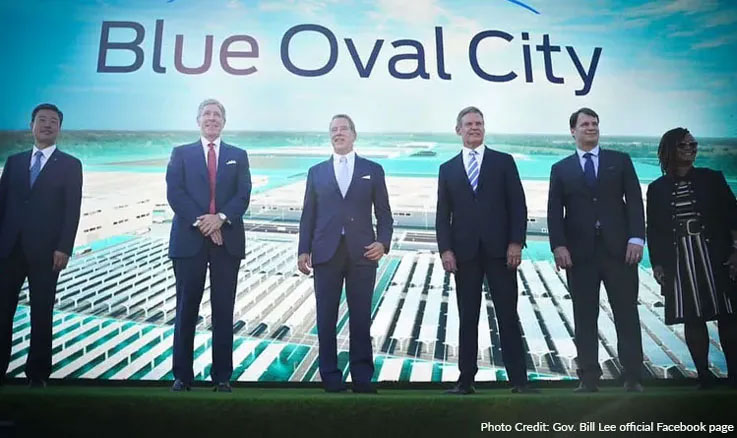Image Credit: Gov Bill Lee / Facebook
The Center Square [By Jon Styf] –
Billion-dollar economic incentives, including the one that Tennessee gave to Ford for its plan to build a $5.6 billion electric truck plant outside Memphis, are increasing across the country, according to a new report from The Center for Economic Accountability.
And while fewer economic incentives have been awarded during the past two years, the average amounts of those incentives have increased significantly even in inflation-adjusted funds.
While the Tennessee Legislature approved $884 million in incentives toward Ford’s Blue Oval City in a special session last fall, the overall incentive package for the project is expected to exceed $1 billion.

If an incentive deal is announced for a new Tennessee Titans stadium, expected to include at least $1.5 billion in public funding for the new stadium alone, it will be added to the list as well.
“America’s governors and mayors are shoveling billion-dollar corporate welfare megadeals out the door this year at a rate that would normally take them a decade or more to achieve,” said John C. Mozena, president of the CEA. “Under pressure from constituents to ‘do something’ about the economy and with their budgets deceptively flush with one-time federal dollars, they’re making short-sighted but big-ticket decisions that will be imposing massive costs on our communities for decades to come.”
The report used inflation-adjusted data from Good Jobs First showing that there was one billion-dollar incentive in the 1980s, two in the 90s, 10 in the 200s, 12 in the 2010s and already 12 in the 2020s.
The first deal mentioned was for Sears to move its corporate offices from Chicago to a campus in suburb Hoffman Estates in 1989.
The report then cited Site Selection Group’s database showing that there was a 13.4% decrease of subsidized projects in 2021 compared to the year before but the total incentive value saw a 94.8% increase.

Last month alone, Tennessee awarded six incentive grants worth more than $1 million. Tennessee’s Department of Economic and Community Development, meanwhile, announced those six incentive-grant projects without disclosing the incentive amounts.
The report also cited academic research showing that, while economic incentives do not help states, they do bring political and financial benefit to the politicians who approve those incentives through large political donations.
“The evidence has been clear for some time that economic development subsidies are much better political tools for the politicians who hand them out than they are economic tools for the communities they’re supposed to improve,” said Mozena. “What we’re seeing in 2022 is that elected officials across the country are betting that big and flashy announcements of future ‘job creation’ will hopefully buy them enough credit with voters to survive the upcoming elections.
“It’s the fundamental truth of economic development subsidies: They don’t exist to create jobs as much as they do to make voters believe that politicians are responsible for creating jobs.”


About the Author: Jon Styf, The Center Square Staff Reporter – Jon Styf is an award-winning editor and reporter who has worked in Illinois, Texas, Wisconsin, Florida and Michigan in local newsrooms over the past 20 years, working for Shaw Media, Hearst and several other companies. Follow Jon on Twitter @JonStyf.



3 Responses
Yup, financing boondoggles.
If you want to find the crooks, follow the money trail.
Tax payer funded corporate welfare and companies headed already for Chapter 11 with kick backs every where!! Follow the Money will lead to the Corrupt!